 Undoubtedly, one of the pleasures of autumn is that classic crusted piece of American cookery, the Apple Pie.
Undoubtedly, one of the pleasures of autumn is that classic crusted piece of American cookery, the Apple Pie.
But how American, really, is Apple Pie?
Do you want the short answer or the long answer? How 'bout both?
The short answer: Apple pie is all-American, in the same way that the nation plays host to all sorts of ethnicities and influences: that is to say, a real melting pot.
...and that brings us to the long answer.
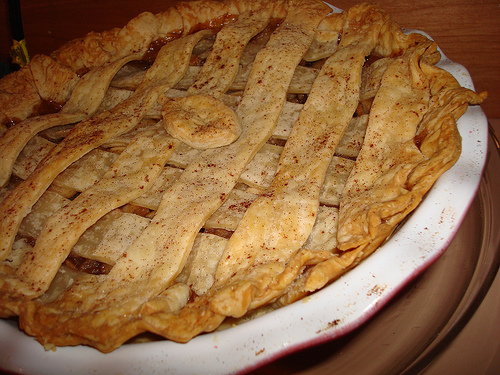 To really consider the humble pie's beginnings, we've got to go back--way back. As you learned so long ago on this very site when we discussed the history of Pumpkin pie, it's probably best to look at most American pies starting from the bottom up (that is to say: consider the crust). Per aforementioned writeup:
To really consider the humble pie's beginnings, we've got to go back--way back. As you learned so long ago on this very site when we discussed the history of Pumpkin pie, it's probably best to look at most American pies starting from the bottom up (that is to say: consider the crust). Per aforementioned writeup:
The origins of the pie stretch way back to ancient Egypt, where an early version of the pastry was made with honey and nuts in bread dough, in our opinion they came into their own during medieval times. Pies (charmingly called “coffins” then) became popular for being both a food and a vessel—easy to transport, hearty and filling. Of course, being baked without a pan at the time, the crust was...well, pretty crusty and inedible. But, it did protect the (usually savory) contents on jousts and voyages to and from the castle. Over the years, the piemaking method improved, and the size of a typical pie increased—they had to be pretty big after all to fit four and twenty blackbirds.
But there was also a pleasant and perhaps unexpected side effect to these advances in baking: the crust also started to taste good (or at least to merit attention). Per What's Cooking America:
It wasn't until the 16th century that cookbooks with pastry ingredients began appearing. Historian believe this was because cookbooks started appearing for the general household and not just for professional cooks.
 From the same source, a recipe from 1545 seems to pay attention to details which are meant to yield a tasty crust:
From the same source, a recipe from 1545 seems to pay attention to details which are meant to yield a tasty crust:
To Make Short Paest for Tarte - Take fyne floure and a cursey of fayre water and a dysche of swete butter and a lyttel saffron, and the yolckes of two egges and make it thynne and as tender as ye maye.
...OK, so you probably see where I'm going with all of this crusty talk. Basically, while crust was initially seen as a vessel, a method of transport, it basically turned into "Hey, we might just have something here."
Which brings us to the big question: What about apples?
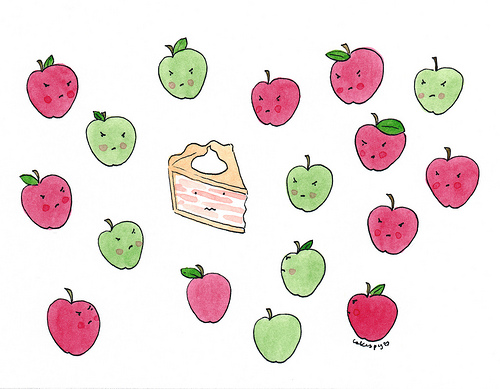 It was my belief that like Pumpkin pie, apple pie didn't make its sweet entry on to the pastry scene til Colonial times in America--after all, in the 1500s and early 1600s, pies in Europe were almost savory. But believe it or not, there is evidence of apple usage in pie form from as early as the mid-1500s (A Proper newe Booke of Cokerye, as discovered here)
It was my belief that like Pumpkin pie, apple pie didn't make its sweet entry on to the pastry scene til Colonial times in America--after all, in the 1500s and early 1600s, pies in Europe were almost savory. But believe it or not, there is evidence of apple usage in pie form from as early as the mid-1500s (A Proper newe Booke of Cokerye, as discovered here)
To make pyes of grene apples - Take your apples and pare them cleane and core them as ye wyll a Quince, then make youre coffyn after this maner, take a lyttle fayre water and half a dyche of butter and a little Saffron, and sette all this upon a chafyngdyshe tyll it be hoate then temper your flower with this sayd licuor, and the whyte of two egges and also make yourcoffyn and ceason your apples with Sinemone,Gynger and Suger ynoughe. Then putte them into your coffin and laye halfe a dyshe of butter above them and so close your coffin, and so bake them.
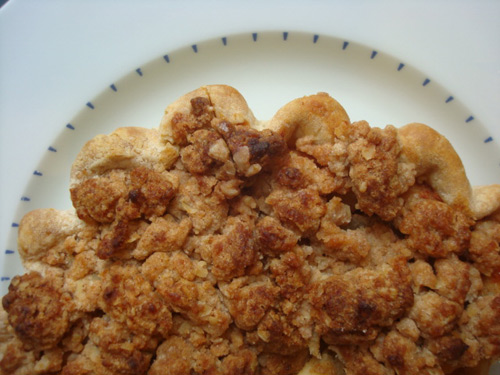 Nonetheless, it seems that when the concept of Apple Pie made the leap stateside with the Pilgrims, it truly came into its own as a uniquely American treat. Not right away, of course--initially only crabapples could be found, but ultimately the timing of the advent of apples as a US crop seemed to time out nicely with sugar becoming more readily available, and as anyone knows, apple pie is much better when made with sugar. Pies in general were quite popular during the settlers' first lean years in the US, filled with produce from the New World -- this is the time during which pumpkin pie became a "thing", for instance. But the popularity of apple pies and puddings is not a big surprise--after all, apples keep well, and can be dried for use year-round, so it makes sense that they would become a go-to item in the Colonial kitchen.
Nonetheless, it seems that when the concept of Apple Pie made the leap stateside with the Pilgrims, it truly came into its own as a uniquely American treat. Not right away, of course--initially only crabapples could be found, but ultimately the timing of the advent of apples as a US crop seemed to time out nicely with sugar becoming more readily available, and as anyone knows, apple pie is much better when made with sugar. Pies in general were quite popular during the settlers' first lean years in the US, filled with produce from the New World -- this is the time during which pumpkin pie became a "thing", for instance. But the popularity of apple pies and puddings is not a big surprise--after all, apples keep well, and can be dried for use year-round, so it makes sense that they would become a go-to item in the Colonial kitchen.
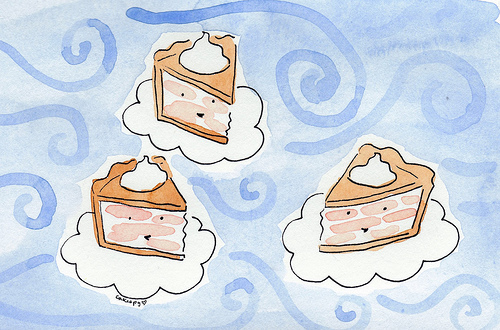 What's on top?
What's on top?
So, there is some argument about how to best enjoy apple pie (and we won't even go into family arguments about the pie recipe itself). Double or lattice crust, crumb or streusel topping? A la mode, or with a slice of Sharp cheddar?
Not that you asked, but here's my stance.
While double crust varieties are undoubtedly the oldest and most traditional way of preparing apple pie, I'd like to humbly make a case for crumb. I've always called this variation "Dutch Apple Pie", although it seems that technically "Dutch Apple Pie" tends to refer to copious amounts of cinnamon in the recipe as opposed to the crumb topping. For the purposes of this entry, though--let it be known I am talking about the crumb-topped version, which is often seen in Pennsylvania Dutch country.
It's hard to understand why anyone who has ever had a crumb-topped apple pie would ever go back to double crust. It's got a delectable crunch! The top crust isn't too hard, and doesn't crack away unevenly with the filling! It's sweet, salty, rich in flavor, and delicious! Please, tell me why I'm wrong about this--I dare you.
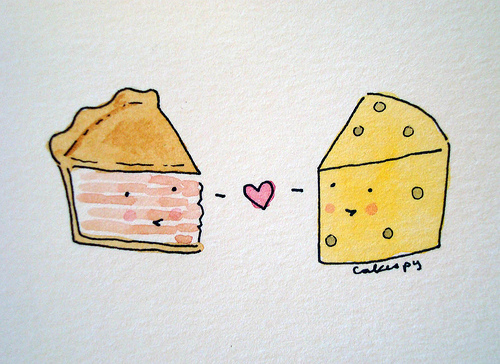 In my mind, the only reason you'd ever choose double crust over crumb or streusel topping is if you're eating your pie New England style--with a slice of sharp cheddar cheese. That tradition is interesting--as I discovered on Food Timeline,
In my mind, the only reason you'd ever choose double crust over crumb or streusel topping is if you're eating your pie New England style--with a slice of sharp cheddar cheese. That tradition is interesting--as I discovered on Food Timeline,
The practice of combining cheese, fruit, and nuts dates back to ancient times. These were often served at the end of a meal because they were thought to aid in digestion. From the earliest days through the Renaissance, the partaking of these foods was generally considered a priviledge of the wealthy. This practice was continued by wealthy dinners composed of many courses up until the 19th century. Apples and cheesemaking were introduced to the New World by European settlers. These people also brought with them their recipes and love for certain combinations. This explains the popular tradition of apple pie and cheddar cheese in our country.
Of course, I'd be remiss at this point to not touch upon what is undoubtedly the most popular accompaniment for apple pie--ice cream. Serving pie "A la mode", or "in the current style or fashion", means that you're serving it (usually warm) with a big ol' scoop of ice cream on the side. Where does the term come from? Can't say whether it's true or not, but there is a rather sweet story attached to it, via a reprint from Sealtest Magazine, which I discovered via Barry Popik:
We have it that the late Professor Charles Watson Townsend, who lived alone in a Main Street apartment during his later years and dined regularly at the Hotel Cambridge, now known as the Cambridge Hotel, was wholly responsible for the blessed business.
One day in the mid 90’s, Professor Townsend was seated for dinner at a table when the late Mrs. Berry Hall observed that he was eating ice cream with his apple pie. Just like that she named it “Pie a la Mode”, and we often wondered why, and thereby brought enduring fame to Professor Townsend and the Hotel Cambridge.
Shortly thereafter the Professor visited New York City, taking with him a yen for his favorite dessert new name and all. At the fashionable Delmonico’s he nonchalantly ordered Pie a la Mode and when the waiter stated that he never heard of such a thing the Professor expressed a great astonishment.
“Do you mean to tell me that so famous an eating place as Delmonico’s has never heard of Pie a la Mode, when the Hotel Cambridge, up in the village of Cambridge, NY serves it every day? Call the manager at once, I demand as good service here as I get in Cambridge.”
But no matter whose story you believe, one thing is for sure: apple pie served with ice cream is delicious. Especially when it's crumb-topped pie.
No doubt about it: Apple pie certainly serves up a thought-provoking slice of American history. But as for the final word? I believe that this quote I found on Food Timeline seems to sum it up nicely:
"When you say that something is "as American as apple pie," what you're really saying is that the item came to this country from elsewhere and was transformed into a distinctly American experience." --As American as Apple Pie, John Lehndorff, American Pie Council.
